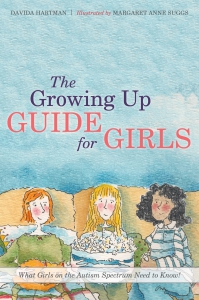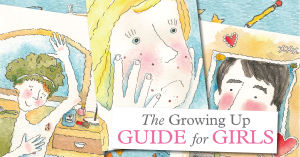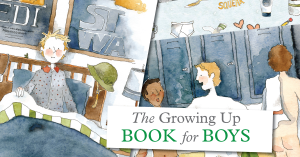Davida Hartman is a Senior Educational Psychologist who has been working with children and adolescents with Autism Spectrum Disorder for fifteen years. Author of the two new books The Growing Up Guide for Girls and The Growing Up Book for Boys, Davida shares her top ten tips for parents to help guide their children through the confusing changes during the pre-teen and teenage years.
Who remembers how they learned about growing up and all that comes with it; body changes, hair growth, periods, wet dreams or dating? Was it in the school yard, from a less than well-intentioned sibling or being sat down by an embarrassed parent for a speech that made no sense and was never to be spoken again? Although we all no doubt found 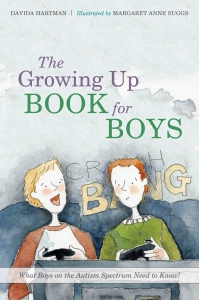
the whole thing a bit confusing and sometimes downright worrying, eventually most of us managed to muddle through it all without too much trauma.
You can take it as a given that children on the autism spectrum will find all of this stuff even more difficult to figure out. And let’s face it – as tempting as it may be to follow in our parents footsteps and either ignore it completely or give a once-off talk and never have to think about it again, any parent of a child with autism knows that talking about it once is going to make very little difference to their child being able to change a sanitary pad or finding the motivation to shower every day.
So if a one off ‘talk’ isn’t going to cut it, what will? Here are 10 tips:
- Decide what your key messages are going to be and be prepared to repeat them a lot. Don’t be too ambitious, you can always pick new key messages at a later stage.
- Get their teacher on board with the same key messages so that there can be even more repetition in a different environment (such as school).
- Fake it till you make it! No matter how embarrassed or uncomfortable you might feel, try your best to give the information clearly and calmly using a positive, upbeat tone of voice.
- Be concrete and use correct terminology (i.e. not made up names that nobody outside of the family will understand). Also be careful about language being taken literally (e.g. that boys’ voices do not literally ‘break’).
- Keep it visual. This might mean reducing language, focussing on pictures and single words, using social stories or visual schedules or perhaps adding speech or thought bubbles to comic type graphics. If your child learns best through PECS (Picture Exchange Communication System) teach them that way, likewise if they learn best through social stories. Visual organisers such as relationship circles or timelines can also be really useful.
- Use this information to create a ‘growing up’ scrapbook or folder which can be reviewed regularly. This can be added to and adapted as the child gets older and will be meaningful as it can contain pictures and information relevant to them, e.g. pictures of members of their family growing from a baby into an adult.
- If you are going to buy resources to help you, be aware of the confusing graphics and language that are sometimes used and make them difficult to be understood by a child with ASD. Be sure to use information that is presented in a clear, visual and factual way that your child will understand.
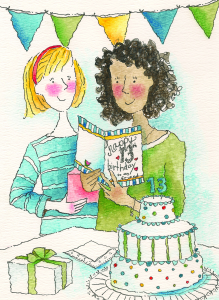
- Special interests are a great way of making learning interesting, fun and meaningful. For example, if your child loves a particular superhero, create problem-solving scenarios in which the superhero figures out what to do in areas that your child is struggling with (e.g. appropriate touch with strangers).
- If you are lucky enough to have them on board, using peers and siblings can be an extremely valuable teaching tool. In the teenage years children tend to pay more attention to what their peers say about a particular topic than their parents or teachers. For example, you could decide to get an older sister or next door neighbour on board to talk to your daughter about the dangers of internet dating. Or a small group of carefully chosen boys could be taught how to sensitively support your son to learn about the importance of good body odour and washing.
- Provide real life practice, like role plays and supported experiences in community (e.g. going to the shop to pick a deodorant they like). Children on the spectrum can be very good at learning by rote what they should do in a certain situation (e.g. being able to list internet safety rules or what to say to a girl they like), but can have difficulty applying this knowledge when it matters. Real life practice is vital!
Davida Hartman is a Senior Educational Psychologist in the Developmental and ASD Psychology Department for Carlow and Kilkenny, Irish Health Service Executive. She is a regular lecturer and trainer on sexuality and relationship education for children with ASD and consults to a number of different groups and agencies. She has been working with children and adolescents with ASD for fifteen years in the capacity of a psychologist and a teacher. Davida received her undergraduate degree in Psychology from Trinity College Dublin, her MA in Educational Psychology from University College Dublin, and she is a Registered Psychologist with the Psychological Society of Ireland (PSI).
Read more about Davida’s new books The Growing Up Guide for Girls and The Growing Up Guide for Boys.
